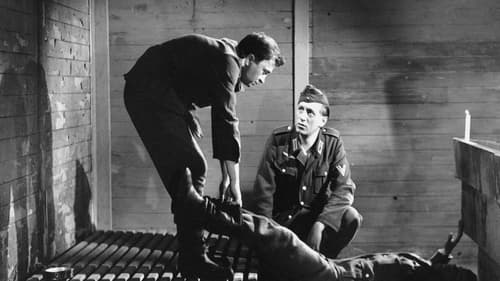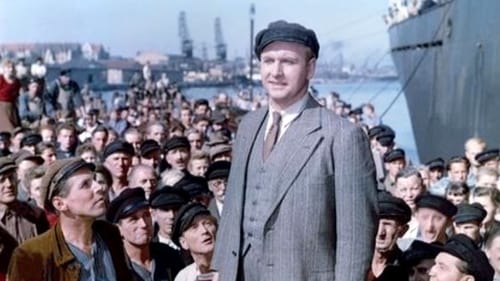
Fischer





Herr Mahlke
The five-part feature, based on the novel by Helmut Sakowski, focuses on the friendly but also rival relationship between Druskat and the self-righteous Max Stephan, an old pal with different attitudes towards life and socialism . Druskat came to Mecklenburg as a refugee after World War II, became an integral part of the community, but also repeatedly caused a stir. Since the death of his wife he lives only with his daughter Anja, although there were enough women who wanted to be with him. Now he´s chairman of the LPG, the "volutary" federation for agriculture and animal husbandry. One evening, two men from the public prosecutor's office come to pick him up. He seems prepared, but Anja doesn't know why. Her first way leads her to Max Stephan, LPG chairman in the neighboring village. She happened to be there during the last argument between them, Max threatened to literally destroy Daniel. Did he carry out this threat? In conversations with the villagers, she gradually learns the truth.


Kurbels Vater
15-year old Klaus Kambor, called Kurbel, is living in a village in Lusatia and already thinks of himself as an adult. He can hold a lot of rhubarb wine and has already kissed a girl. But with his new method of lawn mowing, which he thinks is brilliant, Klaus makes a big mistake: He causes a wild fire in the forest. Then he does not react adult-like at all, but shirks the responsibility, which leads to the break-up with his girlfriend Daniela. Furthermore, Klaus does not realize that several of the places he likes the most in his environment are now going to be sacrificed to mining. When Klaus becomes friends with the teacher Konzak and with the construction worker Jule, he feels understood for the first time and starts to take more responsibility.

Pelzer

In 1920, Michael, the son of a German laboring man, decides to travel to Russia. As "red horseman" he wants to support the socialist revolution and fight for the welfare of the working class. The journey towards the east turns out to be both a big adventure and a severe ethical test for the young man. He has to escape the German Armed Forces and ends up at a traveling circus where he falls in love with Fanny, a dressage rider. He overcomes the temptation to stay with her at the circus and - after briefly joining a gang of teenage thieves - he eventually boards a ship heading east. Aboard the ship he finds out that the seamen are transporting weapons for the hostile members of the White Army.

A day before the beginning of the Second World War, a young resident of Bydgoszcz falls in love with a German teenager.

August 1961. The former Foreign Legionnaire, King, has collected a gang of hooligans, with whom he creates mischief in the GDR. After some careless work on a construction site, an event during which two people lose their lives, they move to a campsite on the Baltic Sea. With sputtering mopeds, loud radios, and occasional outbursts, the gang makes the vacationers' lives living hell. Unfortunately for them, Lieutenant Czernik discovers the connection between them and the accident at the construction site. To stop them from fleeing to West Berlin, Lieutenant Czernik and the police need to arrest them, one at a time, with King as the last.


Stelzbein
Hatifa is tired of her difficult fate and escapes from the place of her enslavement, a quarry in the desert. There she wanders around in freedom, but ultimately helpless, without water or food. Shortly before dying of thirst, she is saved by the sage Simsal, who is traveling with a caravan of the merchant Ganem. Hatifa quickly makes many friends, including the young servant Hodja. Only to him she confides her secret. The girl had to keep the fact that she was a slave to herself. After all, anyone who helps escaped slaves is mercilessly threatened with the death penalty. Out of consideration for the caravan, they both flee, but are soon picked up by Ganem. When he realizes that he can make a lot of money with Hatifa, he sells her again to a quarry.


Gas, sergeant
East Germany's contribution to the 1957 Cannes Film Festival was the wartime melodrama Betrogen bis zum Juengsten Tag. Had the film been released in the U.S., the title would probably have translated to Duped Till the Last. The film condemns the Nazi mindset by concentrating on a particularly odious cover-up. When his son is involved in the accidental killing of a girl, a Gestapo general pulls strings to save the boy from prosecution. The general manages to pin the blame for the killing on a group of Russians, whereupon he gives the men under his command carte blanche to round up and execute as many innocent Russians as they wish. This act of brutality is contrasted with the pangs of guilt suffered by the son and his co-conspirators.

Bootsmann auf der 'Rico Pecos'
On a barren and stormy island, fishing families eke out a meager existence on what they can catch during summer, and what washes ashore during winter. But little has been washing ashore of late, and their situation worsens. Elders recall how twenty years ago, when the lighthouse keeper’s beacon went dark, a cargo ship broke apart on the cliffs. It proved a bountiful accident for the fishermen. Today people on the island view the conscientious lighthouse keepers with evil hungry eyes...

Hein Heber
This film is the first of a two-part historical and biographical portrait of the communist politician and anti-fascist Ernst Thälmann. In early November 1918, Ernst Thälmann is an unwilling soldier serving on the western front. As the revolutionary movement at home is threatened by the betrayal of the Social Democrats and fissures in the working class, Thälmann calls on his fellow soldiers to put down their weapons and unite with the workers in the communist struggle at home. Thälmann’s qualms about which side he is fighting on continue, but when the local police attempt to prevent a shipment of provisions and supplies from reaching the people in Petrograd, he intervenes and the ship is unloaded. With this moment of clarity, Thälmann continues to follow his political convictions and joins the workers at the Hamburg uprising in October 1923.








